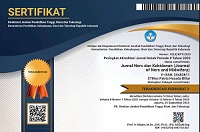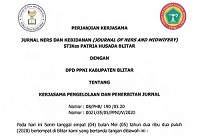Literature Review: The Effect of Acupressure on Menstrual Pain in Adolescents
DOI:
https://doi.org/10.26699/jnk.v9i2.ART.p270-275Keywords:
acupressure, menstrual pain, adolescentsAbstract
Menstrual pain is a condition that bothers most women regardless of age, with the highest percentage being in their teens. Menstrual pain is categorized into mild, moderate, severe and very severe pain. Women who experience menstrual pain can interfere with their activities ranging from daily activities, school to work. One way to reduce menstrual pain non-pharmacologically is to use acupressure. This study aimed to determine the effect of acupressure on menstrual pain in adolescents. This was a literature Review with Systematic Mapping Study (Scoping Study) design. This study used journals published in the last 5 years. The ten journals used were obtained from the Google Schoolar, PubMed and Sciencedirect databases. The journals obtained had passed the selection based on the year of publication, the suitability of the title with keywords, the feasibility of the journal, the ability to access, duplication and inclusion criteria. The journal was then analyzed using the instrument of presenting the results of a literature review. The most widely used acupressure point was sanyinjiao (Sp 6) by pressing or massaging. The intensity of menstrual pain after being given acupressure was decreased, the average pain intensity decreased between before and after being given acupressure starting from a scale of 0.86 to 6.7. The results of the analysis of all journals show P value < a, which meant that there was a significant effect of giving acupressure on decreasing the intensity of menstrual pain in adolescents. Giving acupressure by pressing or massaging certain meridians can increase the levels of endorphins that are useful for reducing the intensity of menstrual pain in adolescents. Education about proper massage techniques will help reduce the level of pain that occurs during menstruation.References
Desiyani Nani. (2018). Fisiologi Manusia Siklus Reproduksi Wanita.
Eva Ellya Sibagariang, Pusmaika, R., & Rismalinda. (2010). Kesehatan Reproduksi Wanita. Cv. Trans Informasi Media.
Heni Setyowati. (2018). Akupresur Untuk Kesehatan Wanita. Unima Press.
Hilda Sulistia Alam. (2020). Upaya Mengurangi Nyeri Persalinan Dengan Metode Akupresur. Cv. Media Sains Indonesia.
Radyanto Iwan Widya Hartono. (2012). Akupresur Untuk Berbagai Penyakit. Rapha Publishing.
Ridwan, M. & Herlina. (2015). Metode Akupresur Untuk Mengatasi Nyeri Haid. 6.
Risma A.P., Anggit I.K., Azky Jayaninta, Jurniati, Nisa K., & Retno D.A. (2020). Akupresur Pada Remaja Untuk Mengurangi Nyeri Haid.
Wong. (2011). 9 Terapi Pengobatan Terdahsyat. Penebar Plus.
Fitria, F., & Haqqattiba’ah, A. (2020). Pengaruh Akupresur Dengan Teknik Tuina Terhadap Pengurangan Nyeri Haid (Disminore) Pada Remaja Putri. Jurnal Ners Dan Kebidanan (Journal Of Ners And Midwifery), 7(1), 073–081. Https://Doi.Org/10.26699/Jnk.V7i1.Art.P073-081
Othman, S., Aly, S., & Mady, M. (2019). Effect Of Acupressure On Dysmenorrhea Among Adolescents. Journal Of Medicine In Scientific Research, 2(1), 24. Https://Doi.Org/10.4103/Jmisr.Jmisr_2_19
Sumanto. (2013). Penurunan Nyeri Dismenore Menggunakan Titik Akupuntur Guanyuan (Ren 4), Guilai (St 29) Dan Sanyinjiao (Sp 6) Pada Mahasiswi Poltekkes Surakarta. 4(1).
Tyas, J. K., Ina, A. A., & Tjondronegoro, P. (2018). Pengaruh Terapi Akupresur Titik Sanyinjiao Terhadap Skala Dismenore. Jurnal Kesehatan, 7(1), 1. Https://Doi.Org/10.46815/Jkanwvol8.V7i1.75
Wijayanti, H., & Selviana, S. (2019). Akupresure Sanyinjiao Point Mampu Menurunkan Intensitas Nyeri Dismenorhea Primer. Jurnal Smart Kebidanan, 5(2), 70. Https://Doi.Org/10.34310/Sjkb.V5i2.196






